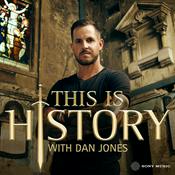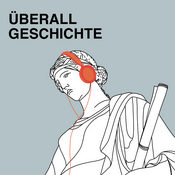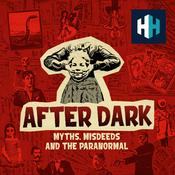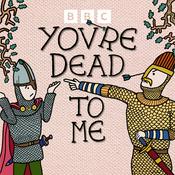130 Episoden
- Melvyn Bragg and guests explore typology, a method of biblical interpretation that aims to meaningfully link people, places, and events in the Hebrew Bible, what Christians call the Old Testament, with the coming of Christ in the New Testament. Old Testament figures like Moses, Jonah, and King David were regarded by Christians as being ‘types’ or symbols of Jesus.
This way of thinking became hugely popular in medieval Europe, Renaissance England and Victorian Britain, as Christians sought to make sense of their Jewish inheritance - sometimes rejecting that inheritance with antisemitic fervour. It was a way of seeing human history as part of a divine plan, with ancient events prefiguring more modern ones, and it influenced debates about the relationship between metaphor and reality in the bible, in literature, and in art. It also influenced attitudes towards reality, time and history.
With
Miri Rubin, Professor of Medieval and Early Modern History at Queen Mary, University of London
Harry Spillane, Munby Fellow in Bibliography at Cambridge and Research Fellow at Darwin College
And
Sophie Lunn-Rockliffe, Associate Professor in Patristics at Cambridge.
Producer: Eliane Glaser
Reading list:
A. C. Charity, Events and their Afterlife: The Dialectics of Christian Typology in the Bible and Dante (first published 1966; Cambridge University Press, 2010)
Margaret Christian, Spenserian Allegory and Elizabethan Biblical Exegesis: The Context for 'The Faerie Queene' (Manchester University Press, 2016)
Dagmar Eichberger and Shelley Perlove (eds.), Visual Typology in Early Modern Europe: Continuity and Expansion (Brepols, 2018)
Tibor Fabiny, The Lion and the Lamb: Figuralism and Fulfilment in the Bible, Art and Literature (Palgrave Macmillan, 1992)
Tibor Fabiny, ‘Typology: Pros and Cons in Biblical Hermeneutics and Literary Criticism’ (Academia, 2018)
Northrop Frye, The Great Code: The Bible and Literature (first published 1982; Mariner Books, 2002)
Leonhard Goppelt (trans. Donald H. Madvig), Typos: The Typological Interpretation of the Old Testament in the New (William B Eerdmans Publishing Co, 1982)
Paul J. Korshin, Typologies in England, 1650-1820 (first published in 1983; Princeton University Press, 2014)
Judith Lieu, Image and Reality: The Jews in the World of the Christians in the Second Century (T & T Clark International, 1999)
Sara Lipton, Images of Intolerance: The Representation of Jews and Judaism in the Bible Moralisee (University of California Press, 1999)
Montague Rhodes James and Kenneth Harrison, A Guide to the Windows of King's College Chapel (first published in 1899; Cambridge University Press, 2010)
J. W. Rogerson and Judith M. Lieu (eds.), The Oxford Handbook of Biblical Studies (Oxford University Press, 2008)
In Our Time is a BBC Studios Audio production - Melvyn Bragg and guests discuss the Hindu goddess Kali, often depicted as dark blue, fierce, defiant, revelling in her power, and holding in her four or more arms a curved sword and a severed head with a cup underneath to catch the blood. She may have her tongue out, to catch more blood spurting from her enemies, be wearing a garland of more severed heads and a skirt of severed hands and yet she is also a nurturing mother figure, known in West Bengal as ‘Maa Kali’ and she can be fiercely protective. Sometimes she is shown as young and conventionally beautiful and at other times as old, emaciated and hungry, so defying any narrow definition.
With
Bihani Sarkar
Senior Lecturer in Comparative Non-Western Thought at Lancaster University
Julius Lipner
Professor Emeritus of Hinduism and the Comparative Study of Religion at the University of Cambridge
And
Jessica Frazier
Lecturer in the Study of Religion at the University of Oxford and fellow at the Oxford Centre for Hindu Studies
During this discussion, Julius Lipner reads a translation of a poem by Kamalakanta (c.1769–1821) "Is my black Mother Syama really black?" This translation is by Rachel Fell McDermott and can be found in her book Singing to the Goddess, Poems to Kali and Uma from Bengal (Oxford University Press, 2001)
Producer: Simon Tillotson
Reading list:
Mandakranta Bose (ed.), The Goddess (Oxford University Press, 2018)
John S. Hawley and Donna M. Wulff (eds.), Devi: Goddesses of India (University of California Press, 1996)
Knut A. Jacobsen (ed.), Brill's Encyclopedia of Hinduism, vol 1 (Brill, 2025)
David Kinsley, Hindu Goddesses: Visions of the Divine Feminine in the Hindu Religious Tradition (University of California Press, 1986), especially chapter 8
Rachel Fell McDermott and Jeffrey J. Kripal (eds.), Encountering Kālī in the margins, at the center, in the west (University of California Press, 2003)
In Our Time is a BBC Studios Audio Production - Melvyn Bragg and guests discuss a story that circulated widely in the middle ages about a highly learned woman who lived in the ninth century, dressed as a man, travelled to Rome, and was elected Pope.
Her papacy came to a dramatic end when it was revealed that she was a woman, a discovery that is said to have occurred when she gave birth in the street. The story became a popular cautionary tale directed at women who attempted to transgress traditional roles, and it famously blurred the boundary between fact and fiction. The story lives on as the subject of recent novels, plays and films.
With:
Katherine Lewis, Honorary Professor of Medieval History at the University of Lincoln and Research
Associate at the University of York
Laura Kalas, Senior Lecturer in Medieval English Literature at Swansea University
And
Anthony Bale, Professor of Medieval & Renaissance English at the University of
Cambridge and Fellow of Girton College.
Producer: Eliane Glaser
Reading list:
Alain Boureau (trans. Lydia G. Cochrane), The Myth of Pope Joan (University of Chicago Press, 2001)
Stephen Harris and Bryon L. Grisby (eds.), Misconceptions about the Middle Ages (Routledge, 2008), especially 'The Medieval Popess' by Vincent DiMarco
Valerie R. Hotchkiss, Clothes Make the Man: Female Cross Dressing in Medieval Europe (Routledge, 1996)
Jacques Le Goff, Heroes and Marvels of the Middle Ages (Reaktion, 2020), especially the chapter ‘Pope Joan’
Marina Montesano, Cross-dressing in the Middle Ages (Routledge, 2024)
Joan Morris, Pope John VIII - An English Woman: Alias Pope Joan (Vrai, 1985)
Thomas F. X. Noble, ‘Why Pope Joan?’ (Catholic Historical Review, vol. 99, no.2, 2013)
Craig M. Rustici, The Afterlife of Pope Joan: Deploying the Popess Legend in Early Modern England (University of Michigan Press, 2006)
In Our Time is a BBC Studios Audio production - Melvyn Bragg and guests discuss the doctrine of Karma as developed initially among Hindus, Jains and Buddhists in India from the first millennium BCE. Common to each is an idea, broadly, that you reap what you sow: how you act in this world has consequences either for your later life or your future lives, depending on your view of rebirth and transmigration. From this flow different ideas including those about free will, engagement with the world or disengagement, the nature of ethics and whether intention matters, and these ideas continue to develop today.
With
Monima Chadha
Professor of Indian Philosophy and Tutorial Fellow at Lady Margaret Hall, University of Oxford
Jessica Frazier
Lecturer in the Study of Religion at the University of Oxford and a Fellow of the Oxford Centre for Hindu Studies
And
Karen O’Brien-Kop
Lecturer in Asian Religions at Kings College London
Producer: Simon Tillotson
In Our Time is a BBC Studios Audio Production
Reading list:
J. Bronkhorst, Karma (University of Hawaii Press, 2011)
J. H. Davis (ed.), A Mirror is for Reflection: Understanding Buddhist Ethics (Oxford University Press, 2017), especially ‘Buddhism Without Reincarnation? Examining the Prospects of a “Naturalized” Buddhism’ by J. Westerhoff
J. Ganeri (ed.), Ethics and Epics: Philosophy, Culture, and Religion (Oxford University Press, 2002), especially ‘Karma and the Moral Order’ by B. K. Matilal
Y. Krishan, The Doctrine of Karma: Its Origin and Development in Brāhmaṇical, Buddhist and Jaina Traditions (Motilal Banarsidass Publishers Private Limited, 1997)
N.K.G. Mendis (ed.), The Questions of King Milinda: An Abridgement of Milindapañha (Buddhist Publication Society, 1993)
M. Siderits, How Things Are: An Introduction to Buddhist Metaphysics (Oxford University Press, 2022)
M. Vargas and J. Dorris (eds.), The Oxford Handbook of Moral Psychology (Oxford Univesrity Press, 2022), especially ‘Karma, Moral Responsibility and Buddhist Ethics’ by B. Finnigan
J. Zu, 'Collective Karma Cluster Concepts in Chinese Canonical Sources: A Note' (Journal of Global Buddhism, Vol.24: 2, 2023) - Melvyn Bragg and guests discuss the last pagan ruler of the Roman Empire. Fifty years after Constantine the Great converted to Christianity and introduced a policy of tolerating the faith across the empire, Julian (c.331 - 363 AD) aimed to promote paganism instead, branding Constantine the worst of all his predecessors. Julian was a philosopher-emperor in the mould of Marcus Aurelius and was noted in his lifetime for his letters and his satires, and it was his surprising success as a general in his youth in Gaul that had propelled him to power barely twenty years after a rival had slaughtered his family. Julian's pagan mission and his life were brought to a sudden end while on campaign against the Sasanian Empire in the east, but he left so much written evidence of his ideas that he remains one of the most intriguing of all the Roman emperors and a hero to the humanists of the Enlightenment.
With
James Corke-Webster
Reader in Classics, History and Liberal Arts at King’s College, London
Lea Niccolai
Assistant Professor in Classics at the University of Cambridge and Fellow and Director of Studies in Classics, Trinity College
And
Shaun Tougher
Professor of Late Roman and Byzantine History at Cardiff University
Producer: Simon Tillotson
Reading list:
Polymnia Athanassiadi, Julian: An Intellectual Biography (first published 1981; Routledge, 2014)
Nicholas Baker-Brian and Shaun Tougher (eds.), Emperor and Author: The Writings of Julian the Apostate (Classical Press of Wales, 2012)
Nicholas Baker-Brian and Shaun Tougher (eds.), The Sons of Constantine, AD 337-361: In the Shadows of Constantine and Julian, (Palgrave Macmillan, 2020)
G.W. Bowersock, Julian the Apostate (first published 1978; Harvard University Press, 1997)
Susanna Elm, Sons of Hellenism, Fathers of the Church: Emperor Julian, Gregory of Nazianzus, and the Vision of Rome (University of California Press, 2012)
Ari Finkelstein, The Specter of the Jews: Emperor Julian and the Rhetoric of Ethnicity in Syrian Antioch (University of California Press, 2018)
David Neal Greenwood, Julian and Christianity: Revisiting the Constantinian Revolution (Cornell University Press, 2021)
Lea Niccolai, Christianity, Philosophy, and Roman Power: Constantine, Julian, and the Bishops on Exegesis and Empire (Cambridge University Press, 2023)
Stefan Rebenich and Hans-Ulrich Wiemer (eds), A Companion to Julian the Apostate (Brill, 2020)
Rowland Smith, Julian’s Gods: Religion and Philosophy in the Thought and Action of Julian the Apostate (Routledge, 1995)
H.C. Teitler, The Last Pagan Emperor: Julian the Apostate and the War against Christianity (Oxford University Press, 2017)
Shaun Tougher, Julian the Apostate (Edinburgh University Press, 2007)
W. C. Wright, The Works of Emperor Julian of Rome (Loeb, 1913-23)
Weitere Geschichte Podcasts
Trending Geschichte Podcasts
Über In Our Time: Religion
Discussion of religious movements and the theories and individuals behind them.
Podcast-WebsiteHöre In Our Time: Religion, His2Go - Geschichte Podcast und viele andere Podcasts aus aller Welt mit der radio.at-App
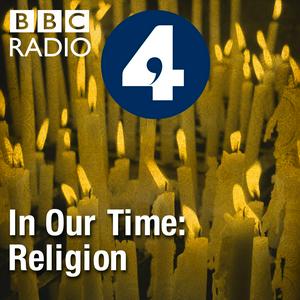
Hol dir die kostenlose radio.at App
- Sender und Podcasts favorisieren
- Streamen via Wifi oder Bluetooth
- Unterstützt Carplay & Android Auto
- viele weitere App Funktionen
Hol dir die kostenlose radio.at App
- Sender und Podcasts favorisieren
- Streamen via Wifi oder Bluetooth
- Unterstützt Carplay & Android Auto
- viele weitere App Funktionen


In Our Time: Religion
Code scannen,
App laden,
loshören.
App laden,
loshören.














